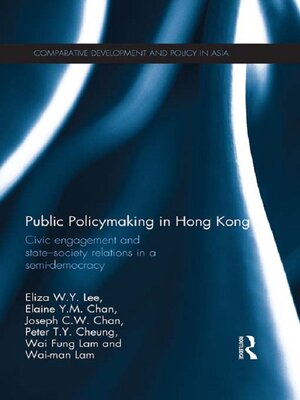Public Policymaking in Hong Kong
ebook ∣ Civic Engagement and State-Society Relations in a Semi-Democracy · Comparative Development and Policy in Asia
By Eliza W.Y. Lee

Sign up to save your library
With an OverDrive account, you can save your favorite libraries for at-a-glance information about availability. Find out more about OverDrive accounts.
Find this title in Libby, the library reading app by OverDrive.



Search for a digital library with this title
Title found at these libraries:
| Library Name | Distance |
|---|---|
| Loading... |
Why and how has civic engagement emerged in the policy process of Hong Kong as an Asian semi-democratic state? This book attempts to answer this question through examining six cases that straddle diverse policy domains. It identifies three explanatory factors, namely, the profile of a policy domain, the structure of societal interest, and the strength of the civil society sector as important in shaping the state's strategy in managing society, hence its propensity to engage. These factors affect the outcome through dynamic interaction between the state and societal actors. The findings outlined in the book show that the development of civic engagement in Hong Kong consists of both society-led and state-led cases. Society-led development brought about a high degree of openness and inclusiveness, whereas state-led civic engagement practices tended to be tactics utilized by the state for appeasing or depoliticizing civil society. Compared with other Asian regimes, the use of 'transgressive contention' as a way to compel the state to engage society is a feature that stands out in the liberal autocratic regime in Hong Kong.







